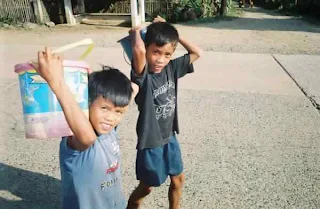When subjected to social criticism, Philippine democracy seems to be more ideal than real because of the economic gap between the few who are rich and the many who are poor. When viewed from the social, economic and historical perspectives, it is apparently less than acceptable.
Today, we have politicians who are self-motivated, but who are also private interest-motivated; they serve their own interest at the expense of others, most often the exploited poor in the rural areas. This is where the need for change is truly felt. The search for the honest committed public servant is on, but is he around in Philippine politics?
 |
| Sitio Baybay, Barangay Santiago, Barotac Viejo, Iloilo April 2006 |
Despite the many shortcomings of Philippine politics, we are still a nation, united and strong against inequity and injustice.
The masses have no need for politics but what they need is an answer to their grievances and frustrations. Does the Philippine democracy we have now give freedom to every citizen? Or is it rather what they call political culture? One that gives central and crucial role to the politician.
While it is fashionable to call politics as a disease in our national life, we must face the fact a majority of the people depend on the government for their well-being. The political culture, therefore, must permit and encourage the use of political figures for a decent purpose. For one, accessibility is the measure of political success. Politicians must perceive accurately the welfare of their constituents and try to serve them well.
But in most cases, politicians regard the idea of democracy as personalized and individualistic instead of populist. Right now, it is the minority who are concentrated in the middle class who favor the political culture. Politics has been institutionalized to promote their personal and economic interest rather than the welfare of the majority. Unless a change takes place, politics will remain the world of the few who are able to manipulate everything in their favor.
Portions adapted from Eleuterio G. Bernardo’s “Democracy: Philippine Style,” Panay State Polytechnic College Faculty Forum 1 (2): 4, 10. Mambusao, Capiz: Panay State Polytechnic College, 1989.
No comments:
Post a Comment